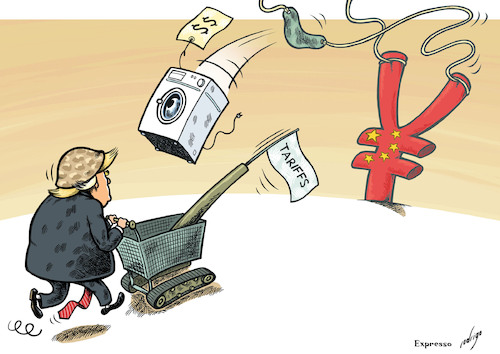
I don’t think that there are any international economic events more important than the following two events: The first is the trade war between the United States and China, and the second is the United Kingdom’s attempts at leaving the European Union. We will discuss the former in this article and focus on the latter in another article.
Like a military war but without equipment and troops, the U.S. is facing off with China in a trade war that has halted hundreds of billions of dollars’ worth of trade. This has made the two parties decide quickly on negotiations, to prevent the risks of continuing this war. This raises the puzzling question for economists around the world: Will those negotiations succeed in reaching an agreement, or will there be no agreement at all? The trade war continues to escalate and is further exacerbated by the economies of both the developing and the developed worlds, including the economies of the Middle East and North Africa, the area where Egypt is situated.
What does the U.S. want from China? The U.S. accuses China of unfair practices that undermine the world trade system, flooding world markets with its products and reducing its currency to support price competition for its own products, at the expense of U.S. and European products. China is accused of improperly transmitting and copying technology and infringing on intellectual property rights. The U.S. wants China to treat U.S. and European companies as government companies and wants to stop subsidies to Chinese state-owned technology companies. The U.S. also wants China to reduce its $235 million trade deficit.
The war began when the White House imposed a punitive 10 percent tariff on Chinese imports worth $250 billion dollars and threatened to raise it to 25 percent in March, if no deal has been reached. In return, China responded by charging the U.S. $110 billion dollars in reprisal fees on cars and spare parts.
What was the effect of this on the two countries and the rest of the world?
Of course, the bigger impact was on the Chinese side; economic indicators confirmed a relative slowdown in the growth rate of the second largest economy in the world, a decrease which continued for the seventh consecutive month of the trade war, and which also caused a decline in the demand for consumption and decreased prices of manufactured products. Economists are skeptical that support and reform attempts could bring China’s economy back to pre-war levels of growth.
As for the effect on the U.S., which plays the role of judge and executioner, we notice that its economy has yet to be affected, but the fear of an imminent decrease in world demand – the most prominent cause of which is this trade war – remains.
It is this issue that can impact the American economy if the opposing factors interact.
To avoid aggravating the trade war, the U.S. and China agreed on a three-month truce, which began on Jan. 1, 2019 and will be over at the end of March. Both sides must come to a solution that will save them and the rest of the world from dangerous consequences.
Some signs of resolution have already emerged, but the new round has been postponed until the end of January. Everyone is optimistic, especially after China announced a suspension of tariffs on U.S. cars and spare parts. It also resumed imports of U.S. soybeans worth $12 billion a year. It has also given a green light for additional U.S. orders.
On our part, we hope that during the truce period and through serious negotiations, both sides will reach solutions to avoid the dangers of the new trade wars.
The countries of the Middle East and the Gulf region play an important role in and are influenced by global events. The Gulf countries are some of the most important oil exporters in the world. Egypt is the largest consumer market in the region and has a large workforce. It relies on tourism revenues, remittances from Egyptians working abroad and revenue from the Suez Canal. All these revenues are negatively affected by any manifestations of a global or regional recession. Therefore, we hope that the negotiations will achieve a comprehensive agreement before the end of the truce and prevent the spread of such reprisals among the various countries of the world.
The author is a member of the board of directors of the Arab-Sudanese Bank and the Suez Canal Bank.

Leave a Reply
You must be logged in to post a comment.